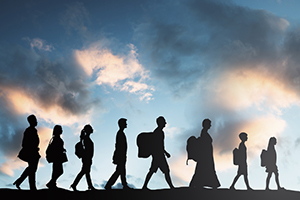The Refugee Educational Advancement Laboratory (REAL):
A New Initiative at the George Washington University
Nov 15, 2021, 17:55 PM
legacy id :
Summary :
George Washington University discusses the devlopment of the Refugee Educational Advancement Laboratory (REAL).
Url :
By Bernhard Streitwieser, Olivia Issa, and Students of the REAL Lab
The Refugee Educational Advancement Lab (REAL) of the George Washington University Graduate School of Education and Human Development (GSEHD) aims to research and document issues related to the challenges surrounding refugees and at-risk migrants pursuing education at all levels. REAL draws on research related to the education of refugees in host countries, refugee and resettlement camps, transit countries, and so-called third countries of resettlement. The REAL team is composed of a faculty advisor from the GSEHD International Education Program (IEP) and students from GSEHD, the Elliott School of International Affairs, and the Columbian College of Arts and Sciences. At its essence, the REAL lab seeks to encourage the training and involvement of GW students as scholar-practitioners eager to learn about the issues facing refugees and at-risk migrants; conduct research and analysis; publish, and broadly become empowered to bring about actionable change and opportunities for refugees and at-risk migrants anywhere in the world.
The development of the REAL lab corresponds with the recent rise in the popularity of the UNHCR’s concept of Complementary Pathways, which seeks to provide new kinds of opportunities for refugees to enter a safe country through avenues outside of formal resettlement such as on a labor or student visa. As such, REAL hopes to contribute to the growing field of research about education as a Complementary Pathway. On February 4, 2021, President Biden issued Executive Order 14013 stating, “[e]xecutive departments and agencies (agencies) should explore the use of all available authorities for humanitarian protection to assist individuals for whom USRAP is unavailable.” This Order has launched a significant push to expand Complementary Pathways, and particularly education, as seen by the new Initiative on U.S. Education Pathways to establish a new visa category and cohort program for refugee students at U.S. colleges and universities. REAL’s research intends to fit into this U.S.-based context of a rise in refugee sponsorship through education by conducting evaluations of the existing programs, best practices, and possible outcomes of developing programs to encourage the best and safest learning environments for refugee students in the U.S. Through conducting these analyses, REAL aims to build off and engage with existing work by the University Alliance for Refugees and at-risk Migrants (UARRM), the Presidents’ Alliance on Higher Education and Immigration (PAHEI), the World University Service of Canada (WUSC), and many others.
In the international context, REAL seeks to engage in research relating to refugee access to higher education globally. With only three percent of refugees currently able to access higher education compared with the 37 percent global average, what formal programs exist to support refugee-background students in higher education? What barriers do students face locally, nationally, or internationally? What responsibilities do the international community have to engage with these issues?
REAL focuses research on education at all levels, from primary education, through secondary and higher education, to the transition into the workforce, to adult life-long learning. Through our short- and long-term research projects, our ongoing review of current scholarship and new studies, and our analysis of data we collect as a team or synthesize by others, we seek to serve as change agents and be a touchpoint for stakeholders, research and advocacy organizations, policymakers, and any other interested parties.
Categories :
- Displaced & Vulnerable Students
- International
